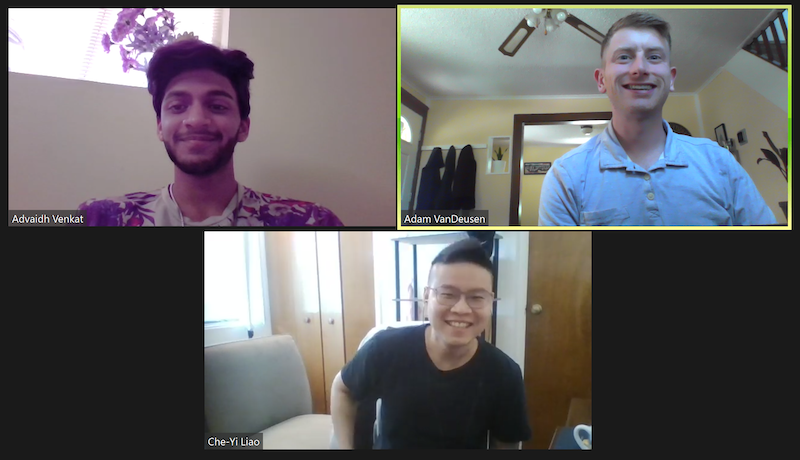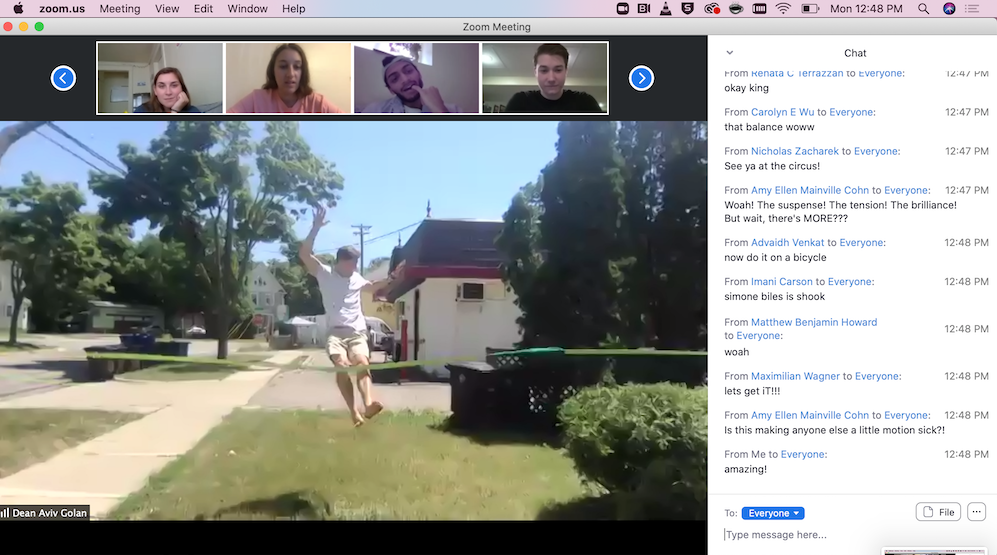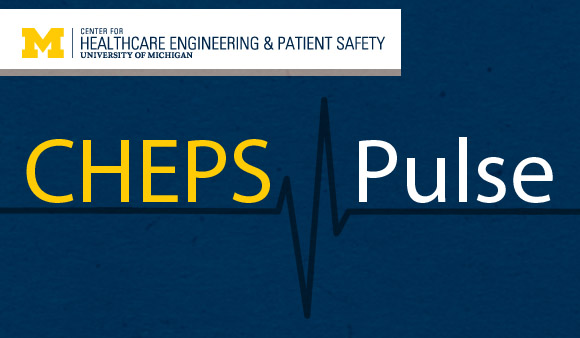In This Issue
CHEPS and COVID-19
As it did for many, COVID-19 changed life at CHEPS almost overnight. As some students stayed in Ann Arbor and some returned to homes across the globe, this meant not just adjusting to virtual meetings but finding meeting times that worked across time zones; as much as we all love our work here at CHEPS, nobody wants to do it at 3 a.m. in their local time zone. As usual, teamwork is what made it all come together; CHEPSters found new ways to get things done and support one another during a difficult time. And, since CHEPS is about more than just work, students also found ways to connect outside of projects with a virtual talent show, Zoom yoga, meetings to discuss journal articles, taking an online course together, and much more. You can read more about the CHEPS student experience in our blog.
Once CHEPS was up and running virtually, it was time to help the health system in their adjustment. Being a part of the COVID command center regular calls, CHEPS Faculty Director Amy Cohn found many ways to assist in COVID work. “CHEPS, through all of our different projects and the relationships that we’ve built over the years, ended up being in a position where we could help with many COVID projects either directly or by helping to bring people together,” said Professor Cohn. She became a liaison between Michigan Medicine and the College of Engineering, putting the CHEPS mission into practice by facilitating work which combined the skills of medical practitioners and engineers to solve urgent problems such as N-95 mask reprocessing, aerosolization concerns in dentistry, and the search for personal protective equipment (PPE). “Sometimes we were doing the work ourselves, sometimes we were just playing matchmaker. But that’s what needed to happen,” said Professor Cohn.
Early on Professor Cohn worked with several collaborators to study the aerosolization of the virus. She’d previously worked with members of this team when she was a committee member on then nursing Ph.D. student Emily Boltey’s defense. Their work resulted in a paper that shared some important information on the use of heated high-flow nasal cannula (HHFNC) to treat patients with COVID-19 in acute hypoxemic respiratory failure. The paper, titled “Variation in Aerosol Production Across Oxygen Delivery Devices in Spontaneously Breathing Human Subjects” is now under peer review and is available to read online.

Around the same time, Dr. Michael Lukela who had collaborated with CHEPS in the past reached out to Professor Cohn when the Office of Diversity, Equity, and Well-Being in the Department of Internal Medicine saw the need for a website to connect practitioners in Internal Medicine with helpers in areas such as grocery shopping, childcare, pet care, and more. “In spite of being pulled in multiple directions to support other important needs for our health system, she did not even pause when I reached out,” he said. Professor Cohn assigned a team including staff members including Liz Fisher (CHEPS) and Rod Capps (IOE) to work with Internal Medicine. “In less than one week, CHEPS assembled a team, developed a website to meet our needs, and continues to provide ongoing technical support for the site,” said Dr. Lukela. “These multi-disciplinary collaborations and the willingness to support others highlight the people that make our University so special.”
CHEPS students also eagerly stepped in to help with COVID-19 work. To aid in all CHEPS projects addressing the virus, a handful of students have been rotating days to send a daily COVID-19 briefing to the entire CHEPS team. This helps make sure everyone is aware of the latest developments and how those developments might impact our COVID work.
One project came about because COVID-19 caused many elective surgeries to be postponed; these surgeries are still important and some have become more urgent with wait-time. A team at CHEPS has been working to create a series of tools that will be publicly available for hospital decision-makers at Michigan Medicine and beyond to help them efficiently and effectively decide how to allocate hospital resources, many of which are limited, as they work through the backlog of elective surgeries that were postponed due to COVID-19.

Emmet Springer, one of the students on the project, said, “I am the kind of person that loves to work on stuff that does have a result that I can see and that is something that I know is actually going and helping someone in the very near future or like right now. So, I really like that aspect of the project where we’re building these tools that are actually going to help people now and we’re continuing to communicate with the surgical leadership at Michigan Medicine and they’re like ‘Oh, yeah. This is actually really helpful.’ It alleviates some of the burden on them. I know I can kind of contribute in my own small way to alleviate some of the stress of COVID.”
Tackling a similar problem, CHEPS and IOE Ph.D. student Adam VanDeusen has been working with the Gastroenterology (GI) group at the VA to help them plan how to gradually reopen from their reduced capacity due to COVID-19 so that patients do not have to wait an excessive amount of time to be seen. As part of the Specialty Access team, Adam had worked with several doctors at the VA who knew CHEPSters had the skills they needed to help address the problem. At the start of the project, in March, the VA was at greatly reduced capacity for colonoscopy, and was trying to determine how to gradually increase capacity over the coming months. Adam’s team looked at not just how to help get patients appointments but if there were measures, such as other procedures, that could help patients as they waited for a colonoscopy. “For me, it was really rewarding because, being from public health, I felt like I should be helping with COVID-19 response. I have a skillset and I want to use it. It was nice that this work I’ve been building on for several years can actually be applied in a scenario where it’s more critical that we get to work quickly,” said VanDeusen.

As we look forward to Fall, we know things will continue to be different. Some students will be on campus, others will be taking classes and working from across the globe. We’ll face logistical and financial challenges as we strive to work in adapted ways. However, we know that our ability to work as a team, come up with creative solutions, and support one another will make a challenging semester doable, just as it did this summer. We’ll tackle whatever comes next together, as we always do. Anyone who would like to support us in our continued work may do so here.
Recent News
- Lunch & Learn with Pamela Martinez Villareal, 7/24/20
- Lunch & Learn with Dr. Preeti Malani, 7/17/20
- Lunch & Learn with Joe East, 7/10/20
- Lunch & Learn with Mark Grum, 6/26/20
CHEPS Student Blog Posts
This summer CHEPS students are blogging to share life at CHEPS from the student perspective.
- Luke Liu, 2020 Industrial & Operations Engineering B.S.
- Renata Terrazzan, Public Health Undergraduate
- Alli VanderStoep, Industrial & Operations Engineering Master’s Student
- Ziqi Wang, IOE/HEPS Master’s Student
- Carolyn Wu, Informatics Undergraduate
- Kristine Wang, 2020 Computer Science B.S.
- Nicholas Zacharek, Industrial & Operations Engineering Undergraduate
- Matt See, 2020 Chemistry B.S.
Where in the World Is CHEPS?

CHEPSters are still working virtually from a variety of locations but finding ways to get together for work and for fun! Here we are watching Dean’s slackline performance during our virtual CHEPS talent show!
Find previous Where in the World is CHEPS? photos on our website.
Center for Healthcare Engineering & Patient Safety | University of Michigan
[email protected] | cheps.engin.umich.edu


